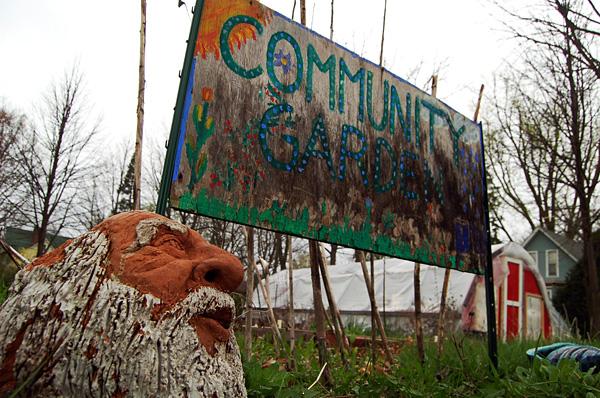
“I’m really interested to garden in Grinnell and get to know the community here,” Vaughan said. “There are people in this community who know way more about gardening than I do, and I’m excited about making connections and building a garden from the ground up.”
The Community Gardens Project received grants from the Sarah Boyer ’08 Community Service Fellowship, an award that gives $3000 for a community service project, as well as President Russell K. Osgood, Michael Sims and the Peace Studies, Prairie Studies, and Environmental Studies Programs. Though the last semester brough cuts to the community service budget, Nost said that the project was fortunate to receive funding.
The group’s main goal is the creation of a community garden in Nyanza Park, one of two parks in the southern half of town. The students recently met with the Grinnell Area Parks and Recreation Board to finalize the location and run through their plans for the summer. “We wanted to work with disadvantaged communities, and there’s a pretty big north/south divide in Grinnell,” Nost said. The garden’s location will give disadvantaged families better access to freshly-grown food and gardening opportunities.
Scheibel says that although the garden will focus mainly on large-scale plants like tomatoes, they have also discussed the benefits of perennials. “We’re thinking rhubarb, asparagus, berry bushes and ground cherry,” said Scheibel. “That way, if the garden ever becomes defunct, people will still be drawn to the space by perennial things coming up every year.”
Last summer, students involved with Project for Peace organized a cooking class for families who received Community Supported Agriculture shares, or weekly shares of a local farm’s produce, hoping to “get people knowledgeable about the sort of things you get in a [CSA] box,” according to Nost.
Though the class was often sparsely attended, the students recognized the community’s need for a cooperative approach to sustainable food. If gardeners are able to share information and techniques, community gardens are more likely to survive from year to year.
This desire for a community-wide approach inspired the group to help Grinnell dwellers plant and maintain their own backyard gardens. Nost says they intend to focus on community members who are limited by age or disability. The group will advertise at the Mayflower Retirement Community this week.
The past year has been successful for EcoHouse residents, between last summer’s Project for Peace and the continual work on campus sustainability. The next step, Nost says, is to help the two campus community gardens flourish by giving students incentive to work there. If the gardens are successfully expanded, he said, students could provide food to the dining hall and increase the College’s involvement with local foods.
“There are a lot of people who already do backyard gardens, but I think that’s on the out,” Nost said. “Especially in times like these, where the economy is pretty tight, I think sparking people’s conscious on ways they can grow their own food is going to be a main goal for the summer.”
Vaughan agreed, adding that community gardens improve nutritional opportunities for students and community members alike. “I think nutrition is a big deal, and if there are vegetables around, people are less likely to eat a lot of processed foods,” Vaughan said.



















































